In a world where change is the only constant, enterprises must not only adapt but thrive amidst digital disruption.
At BCU Business Services, we recognise the pivotal role of digital transformation in reshaping industries and empowering businesses like yours to stay ahead of the curve. Business transformation, encompassing organisational change, is essential for achieving holistic and enduring transformations within a dynamic business environment.
That’s why we’re excited to share six practical steps to kickstart your digital transformation strategy and position your business for success.
What Is Digital Transformation, And Why Does It Matter To Me?
Digital transformation goes beyond adopting new technologies or changing processes. It’s about reimagining how businesses operate, connect with customers, and create value in the digital age by transforming business models.
It’s a strategic journey that involves changing organisational culture and innovating with technology to grow, work efficiently, and stay competitive.
Digital transformation isn’t optional anymore—it’s a necessity for staying relevant amidst digital changes. Whether in traditional fields like manufacturing and finance or in newer areas like e-commerce and fintech, every sector faces challenges and opportunities due to digital advancements.
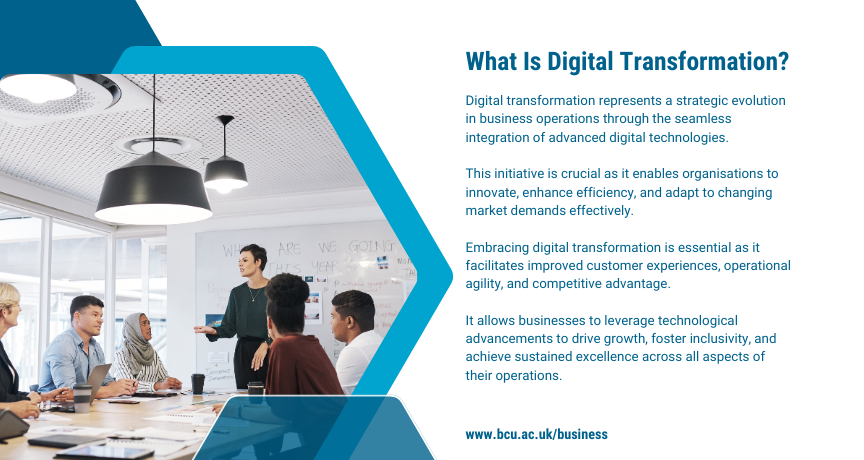
Furthermore, digital transformation impacts everyone in the organisation, not just executives or IT teams. Employees must adapt to new work methods, learn new skills, and keep up with changes.
Meanwhile, customers expect smooth, personalised experiences in every interaction, from online shopping to customer service. Meeting these customer demands is crucial for businesses to succeed.
1. How To Approach Your Budget, Tasks, And Digital Transformation Strategy Roadmap
To develop your digital transformation strategy, it’s necessary to gain a comprehensive understanding of your available funds and the tasks ahead.
We strongly recommend beginning with a thorough review of the financial requirements for your digital transformation project, covering both capital expenditures and operational costs. Be sure to consider various factors such as software licences, hardware upgrades, personnel training, and consultancy fees to ensure an accurate estimation of expenses.
Identifying precise steps and objectives is key to realising your digital transformation goals. You will need to break down larger objectives into specific tasks to enhance clarity and precision. Tracking the success of your digital transformation through key performance indicators (KPIs) can also highlight cost savings and other financial benefits.
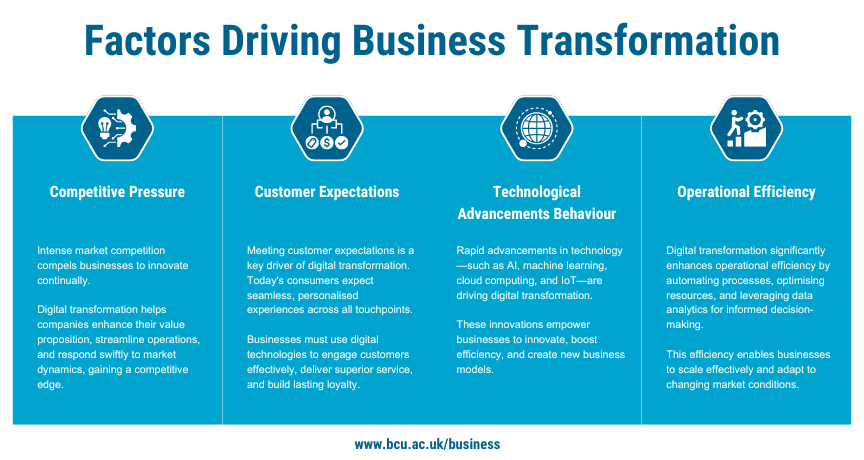
Give priority to tasks based on their alignment with strategic goals, potential impact, and resource requirements. By aligning your budget with these tasks, you can then allocate investments towards initiatives that offer the greatest value to your organisation, promoting business growth and generating additional funds to sustain your ongoing digital transformation strategy.
Creating a roadmap is crucial for ensuring that your digital transformation project stays on track with your budget and strategic goals. You will need to define important goals and criteria for success in your digital transformation roadmap, explaining how each step helps move your strategic priorities forward.
Consider running small pilot projects or tests to validate assumptions and solutions before expanding. Using a structured and flexible approach to planning milestones can help reduce risks, use resources more efficiently, and extract more value from your digital transformation efforts.
2. Get The Right People
Digital transformation is not a solitary journey but rather a collaborative effort that necessitates the expertise of individuals from diverse backgrounds. Workforce transformation, including reshaping workgroups and job titles, is crucial in this process to ensure the right people are engaged and empowered.
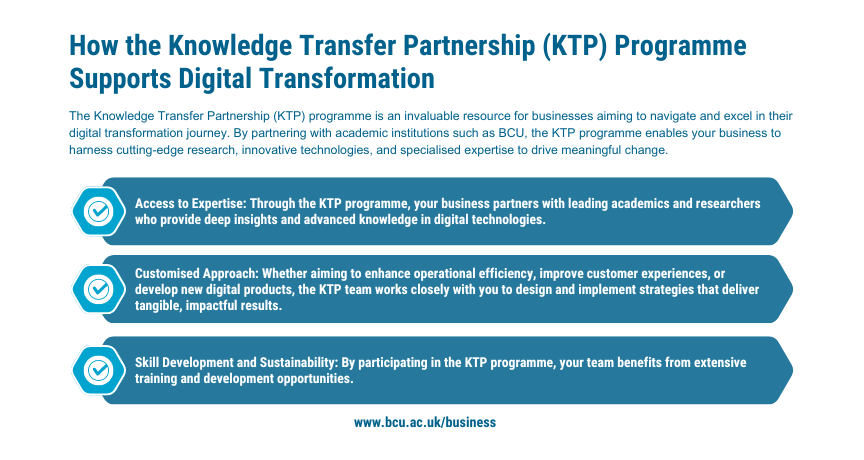
You will need to assemble a cross-functional team comprising individuals with a spectrum of skills and expertise essential for driving success in your digital transformation strategies.
We strongly recommend considering partnering with digital transformation contractors who specialise in specific areas of expertise, in addition to internal team members.
BCU Knowledge Transfer Partnership Case Study - Malthouse's Digital Transformation Journey - YouTube
Look for professionals with backgrounds in technology, data analytics, marketing, customer experience, and user research, among others. Each member of this multidisciplinary team will bring unique insights and capabilities to the table, contributing to the holistic understanding and execution of your digital transformation project.
3. Understand Your Industry And Business Model
You will need to examine your current business model from a digital transformation perspective to pinpoint areas worthy of innovation and advancement. This introspection allows you to identify strategic opportunities for exploiting technology to drive efficiency, improvement, and sustainable growth. Additionally, consider how digitalizing business processes can further enhance these opportunities.
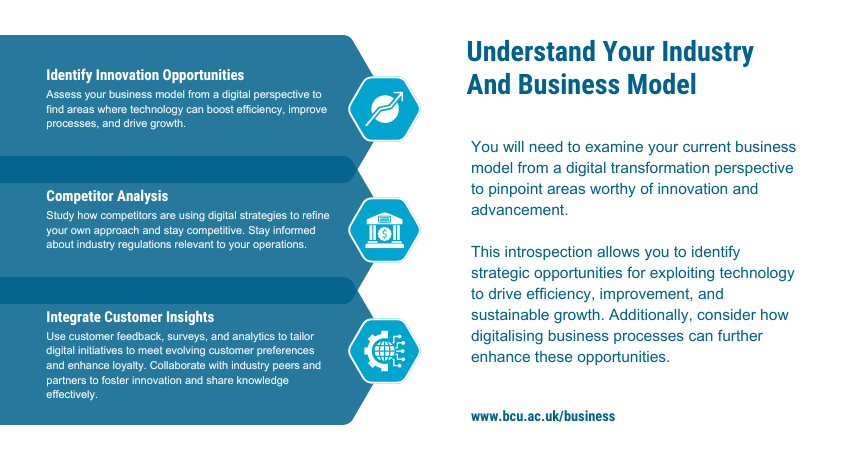
Conducting a comprehensive competitor analysis is essential. By studying how your competitors are applying digital transformation strategies, you will gain valuable insights to inform and refine your own initiatives. Additionally, staying attuned to the regulatory landscape relevant to your industry is critical.
Integrate customer insights gathered from feedback, surveys, and robust data analytics into your digital transformation efforts. Tailoring initiatives to align with evolving customer preferences and behaviours increases the likelihood of success and fosters long-term customer loyalty.
Exploring collaboration opportunities with industry partners can drive innovation and enhance competitiveness in the digital era.
We recommend that you engage with industry peers, suppliers, and strategic partners to foster a culture of knowledge sharing, idea exchange, and collective innovation.
For example, partnering with technology providers can offer access to cutting-edge tools and solutions, while collaborating with academic institutions can provide access to research expertise and emerging talent.
Additionally, forming alliances with complementary businesses or start-ups can facilitate the exchange of ideas and resources, enabling mutual growth and innovation.
4. Implement Digital Technologies
When it comes to implementing digital technology for your digital transformation strategy, you will need to translate your plans into action by carefully selecting digital solutions that align with your strategic objectives and address organisational pain points.
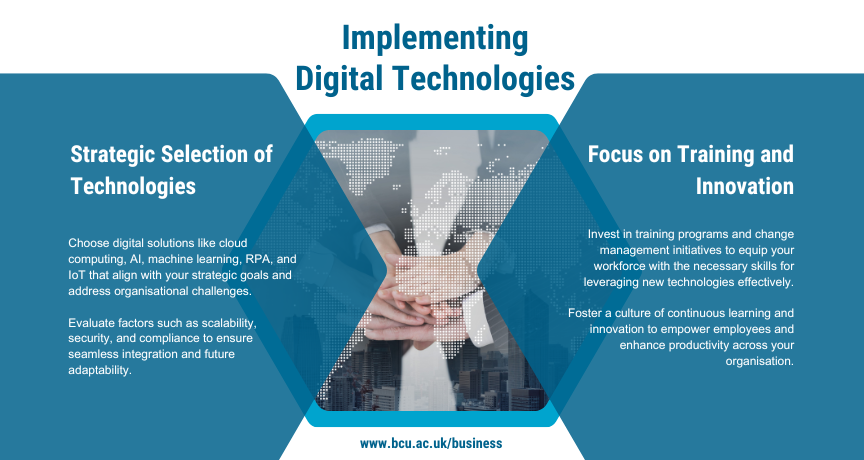
We advise you to start by identifying technologies such as cloud computing, data analytics, artificial intelligence (AI), machine learning, robotic process automation (RPA), and Internet of Things (IoT) devices that can enhance efficiency and drive innovation across your business operations.
During the implementation phase, it’s essential to evaluate factors like scalability, interoperability, security, compliance, and environmental impact.
Choose solutions that seamlessly integrate with your existing systems while providing flexibility to adapt to future needs and industry standards, as well as aligning with sustainability goals and environmental regulations.
Considering environmental factors is crucial to ensure that your digital transformation efforts contribute positively to a sustainable future and comply with initiatives such as the 2050 climate targets.
Investing in comprehensive training and change management initiatives is crucial to ensuring that your workforce has the necessary skills to leverage these technologies effectively. We recommend fostering a culture of continuous learning and innovation, empowering employees to explore new tools and techniques that boost productivity and creativity in their roles.
5. Focus On The Customer
In the landscape of digital transformation, the customer assumes a pivotal role, serving as the North Star guiding all strategic endeavours. Central to your approach should be the prioritisation of initiatives directly aimed at enhancing the customer experience. Digital transformations play a crucial role in this by leveraging technology to innovate and improve customer interactions.
You will need to delve deep into the specifics of your customer journeys and pain points to tailor solutions that resonate profoundly with your audience. This customer-centric ethos not only fosters loyalty but also nurtures brand advocacy, fostering enduring relationships that extend beyond mere transactions.
6. Future-Proof Your Processes
To ensure your strategy stands the test of time, it’s crucial to imbue it with agility, resilience, and an openness to innovation. Integrating digital technology into all areas of a business results in fundamental changes to how businesses operate and deliver value to customers.
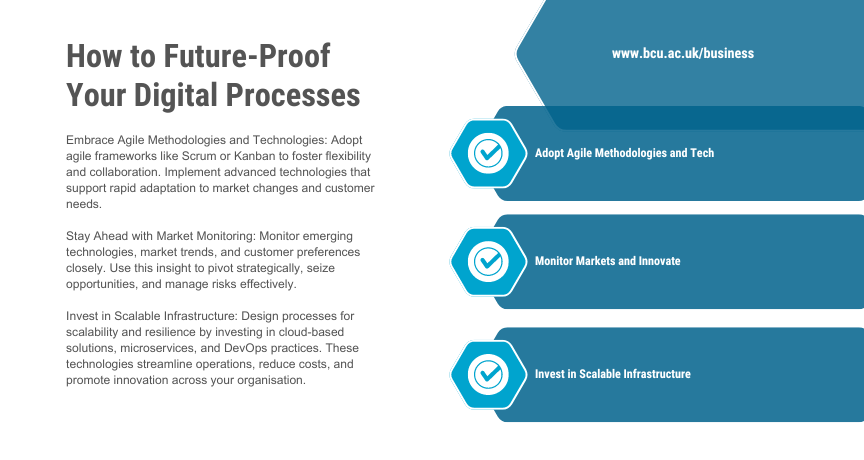
At the heart of this approach lies the adoption of agile methodologies and cutting-edge technologies, empowering your teams to swiftly adapt to evolving requirements and market dynamics. Frameworks like Scrum or Kanban foster collaboration and flexibility, facilitating continuous improvement through rapid iteration and experimentation.
Equally important is the ability to foresee future trends and disruptions, allowing you to strategically pivot and seize opportunities while mitigating risks. By closely monitoring emerging technologies, market shifts, and evolving customer preferences, you can stay one step ahead of the competition.
Designing your processes with scalability and resilience in mind is essential for long-term success. Investing in scalable technologies ensures that your systems can handle increased demands without compromising performance or reliability.
Additionally, investing in digital infrastructure that supports experimentation and rapid iteration is indispensable.
Leveraging cloud-based technologies, microservice architectures, and DevOps practices enables the development of scalable, resilient, and adaptable systems. Not only does this accelerate your time-to-market, but it also reduces operational overhead while fostering a culture of innovation within your organisation.
So How Do I Begin?
Kick off by fostering broad stakeholder engagement throughout your enterprise, involving everyone from frontline staff to senior leadership. It’s crucial to cultivate alignment and buy-in regarding your digital transformation goals and priorities, ensuring that every member of your business is committed to the journey ahead. Engaging different employee groups in digital transformation initiatives is essential to address challenges and ensure a smooth transition.
Next, conduct a thorough assessment of your organisation’s current capabilities, market position, and competitive landscape to inform your strategic decision-making process.
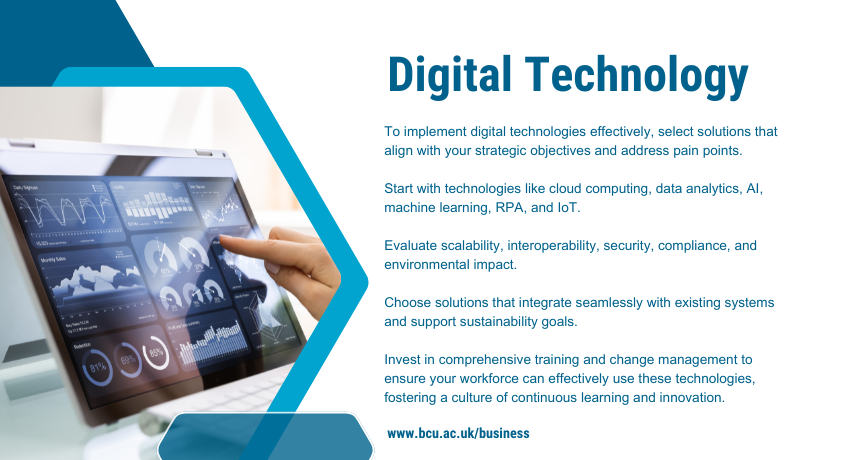
Then, pinpoint and assign importance to specific initiatives that offer tangible value and sustainable growth potential, making sure they closely align with your organisation’s core strengths and strategic objectives.
Data And Analytics
Let’s not forget that data-driven insights steer organisational decision-making and success. Advanced data analytics tools facilitate the collection, processing, and examination of large datasets, providing actionable insights across various aspects of the business. Managing data and resources effectively is crucial when implementing technology as part of a digital strategy to drive business transformation.
To begin, focus on identifying the key performance indicators (KPIs) most relevant to your business objectives. These metrics may include sales figures, customer satisfaction ratings, operational efficiency measures, and more. Through diligent monitoring and analysis of these KPIs, you can gain a comprehensive understanding of your business performance and areas for improvement.
Collaborative Workshops And Brainstorming Sessions
Innovation and problem-solving thrive on collaboration. By convening cross-functional teams in workshops and brainstorming sessions, your business can capitalise on the collective wisdom and creativity of its employees to identify operational gaps and foster innovative solutions. Leveraging these opportunities provides a strategic advantage, enabling your organisation to shed outdated processes and drive the business forward.
To begin, assemble a diverse group of participants representing various departments, roles, and perspectives within the organisation. This diversity ensures a broad spectrum of viewpoints and ideas, enriching the brainstorming process.
Create an environment conducive to idea generation by promoting open communication and idea sharing. Encourage participants to voice their thoughts, share insights, and challenge conventional thinking. Establishing a safe space where all ideas are welcomed and respected empowers employees to think creatively and contribute meaningfully.
Guide the conversation with structured brainstorming exercises and activities designed to stimulate creative thinking. Employ techniques such as mind mapping, SWOT analysis, or design thinking to explore different approaches to addressing operational gaps.
Throughout the workshops, place emphasis on actionable insights and practical solutions that can be effectively implemented. Encourage participants to think beyond traditional boundaries and explore unconventional ideas with the potential to drive real change.
Focus On The "Why?"
It’s clear that digital transformation has become fundamental for businesses striving to excel in today’s ever-evolving environment. By embracing digital technologies, fostering innovation, and prioritising customer-centricity, organisations pave the way for growth, operational efficiency, and lasting customer relationships. A well-defined digital strategy is essential for planning approaches to business digitalization, setting goals, and identifying opportunities.
At BCU Business Services, we have a proven track record of supporting businesses through their digital transformation projects. One way businesses can take advantage of our expertise is through BCU’s Knowledge Transfer Partnership (KTP) programme, where we can work closely with your organisation to transfer our knowledge and skills to your team. This collaborative approach allows businesses to benefit from our experience while building internal capabilities for long-term success in digital transformation.






